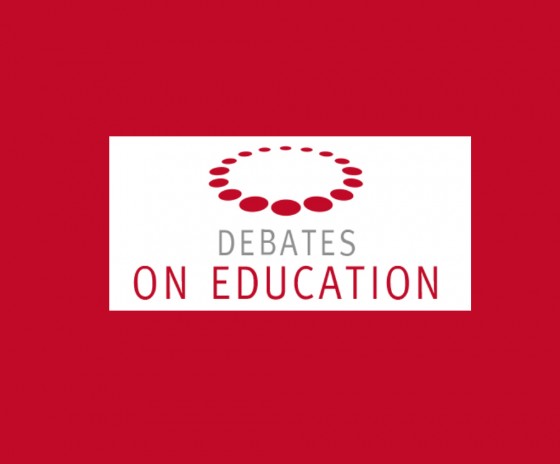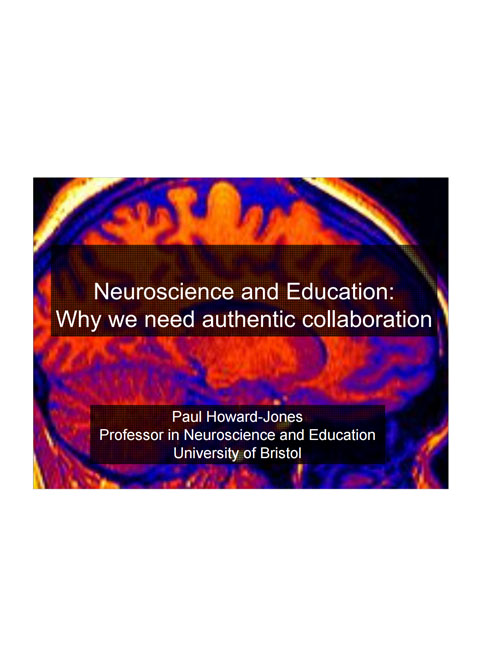Debate on Education with Paul Howard-Jones, professor of Neuroscience and Education at the UK's University of Bristol. www.debats.cat #debatseducacio
Howard-Jones stands out for being a former teacher and inspector of schools, and now a researcher and worldwide point of reference for the development of studies into how to apply neuroscience to improve teaching and learning.Event organized by the Universitat Oberta de Catalunya (Open University of Catalonia) and the Jaume Bofill Foundation, with the collaboration of MACBA.
SUMMARY
A dialogue needs to take place between neuroscientists and educators particularly with regard to breaking neuromyths - theories that have become deep-rooted among teachers and which have no scientific basis. Educators also need to be aware that brain development is effected by the environment and, in the case of children and young people, school is one of their main environments.
Neuroscientific research demonstrates that, although there are parts of the brain that play a more significant role in certain actions, the brain actually works as a unit, with major highways that interconnect different points. Different parts of the brain are involved in every action.
Breaking neuromyths
-Drinking lots of water has not been demonstrated to help brain function in terms of attention. Neither has brain shrinkage been demonstrated in cases where little water is consumed. The brain is already working to ensure equilibriums in the body are maintained: the thirst mechanism is there to prevent us from dehydrating. What has been shown is that excess water leads to a lack of concentration.
-Sugar has not been demonstrated to be harmful to the brain. On the contrary, sugar can actually help with attention levels. It can be harmful to health for other reasons, but not with regard to its effect on the brain.
-So-called brain gymnastics, involving a set of physical exercises with specific movements that promote coordination, have no beneficial effect on the brain.
-There is no evidence showing improved results with regard to learning styles based on the idea that individuals favour one of the senses for receiving information.
-Contrary to popular belief, the continuous consumption of caffeine decreases cognitive ability.
-While it is true that the brain exhibits greater plasticity prior to the age of three and that this is a more intensive period in terms of learning, it is also true that the brain maintains its plasticity throughout life and is constantly remodelling itself. Investment in higher education has been reduced in Britain due to the belief that we must focus investment on the initial stage of education, as it has the potential to provide greater economic return.
Statements that are based on neuroscience
-Visual games and counting on fingers improves mathematical learning potential. The visual representation benefits information retention.
-Dyslexia or dyscalculia can be improved with specific exercises. It is not an irreparable problem.
-Aerobic exercise is extremely beneficial for the brain. Improving the ability to think and be attentive, promoting faster responses and executive function capacity.
-Our brains consolidate what we have learnt during the day while we sleep. It is therefore very important to sleep well and for a sufficient period of time. Cultural actions and changes are needed, principally with regard to the habits of adolescents, who tend to go to sleep late and use technology prior to going to sleep. These are two habits that have negative effects for learning (it has been shown that watching television, using computers, etc., before sleep adversely affect restorative sleep).
-Staggered learning (with a break between periods of learning) is more beneficial than continuous learning.
Games and reward in brain stimulation
-Games result in chemicals being produced in the brain that improve memory and learning. Excitement produces dopamine.
-This brain response is more beneficial when there is an awareness that a certain action will result in a reward and even more so when that reward is uncertain (maintaining the excitement for longer).
-That is why games are useful tools for learning. There are currently 80 schools in Britain operating on that premise, involving 10,000 children aged between twelve and thirteen.
-When games are used in learning, the brain network is activated and the “auto pilot” mechanism, which causes us to disconnect from that going on around us and think about ourselves, remains switched off.





